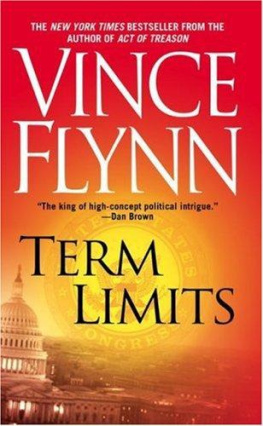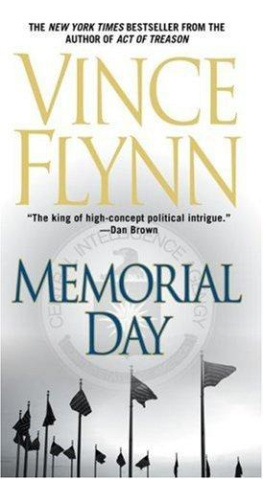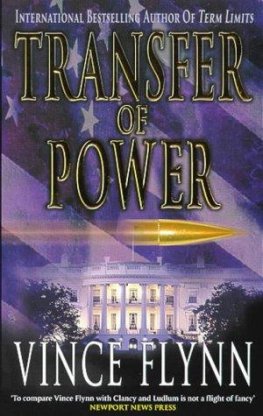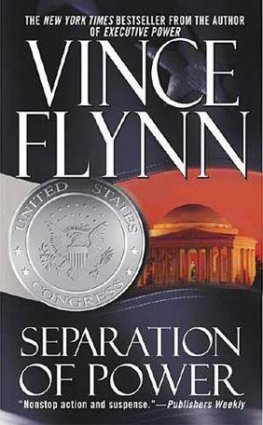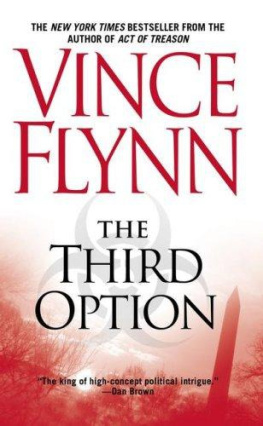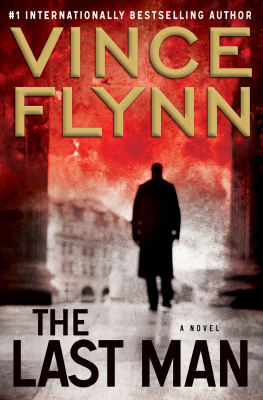Term Limits
Vince Flynn
... Governments are instituted among Men, deriving theirjust Powers from the Consent of the Governed, that whenever any Form ofGovernment becomes destructive of these Ends, it is the Right of the People toalter or to abolish it, and to institute new Government... it is their Right,it is their Duty, to throw off such Government, and to provide new Guards fortheir future Security.
-- THOMAS JEFFERSON,
The Declaration of Independence
THE OLD WOODCABIN SAT ALONE, SURROUNDED BY TREES AND DARKNESS. The shades were drawn, and adog lay motionless on the front porch. A thin stream of smoke flowed out of thechimney and headed' west, across the rural Maryland countryside towardWashington, D.C. Inside, a man sat silently in front of the fireplace, shovingstacks of paper into the hot flames. The papers were the product of months oftedious and meticulous work. Each sheet represented hour upon hour ofsurveillance notes, in-depth subject profiles, and maps of neighborhoodsthroughout the D.C. metropolitan area. He knew when the police patrolled, whenthe newspapers were delivered, who jogged and at what time, and mostimportantly, where his targets slept and what time they awoke. He and his menhad stalked them for months, watching and waiting, patiently discerning whichpart of their daily routine could be exploited-and when they would be mostvulnerable. His strong hands reached for the fire and stopped short. Lettingthem hang near the flames, he flexed them straight, then pulled them into tightfists. The men he had been stalking had sent him to some of the most obscureplaces on the face of the planet to kill people who were deemed a threat to thenational security of the United States of America. He had lost track of thenumber of people he had killed in the service of his country. He had notintentionally blocked the tally from his mind, it was just something he hadnever bothered to calculate.
Whatever thenumber was, he held no regrets for the men he had killed.
They werehonorless, evil psychopaths-killers of innocent civilians.
The solitaryfigure sitting in front of the fire was an assassin of assassins, an exporterof death, trained and funded by the United States government. His short blondhair glowed as he stared deeper and deeper into the flames, the crisp fireeventually turning into a hypnotic blur.
Tomorrow hewould kill for the first time on American soil. The times, places, and targetshad all been chosen. In less than twenty-four hours the course of Americanpolitics would be changed forever.
The sun roseover Washington, D.C marking the start of what would be a long and busy day.With the President's annual budget twenty-four hours away from a full Housevote, the town was in a frenzy.
Congressmen,Senators, bureaucrats, and lobbyists were making a last-minute push to amend orstrike certain elements of the budget.
The count wastoo close to call, and the leaders of both parties were exerting great pressureon their members to vote along partisan lines.
No one wasexerting more pressure than Stu Garret, the President's chief of staff. It wasnearing 9 A.M and Garret was ready to explode.
He was standingin the Blue Room of the White House watching the President read"Humpty-Dumpty" to a group of kindergartners, and his anger wasincreasing by the second.
Garret had toldthe President that the photo op with the kids was out of the question, but theWhite House press secretary, Ann Moncur, had convinced the President otherwise.It was rare for Garret to lose to anyone; even on the smallest point. ButMoncur had sold the President on the idea that, in the throes of a cutthroatbudget battle, it would be good PR for him to look as if he were above thedirty political horse-trading of Washington. Garret had been working around theclock for the last month trying to get the votes needed to pass the budget.
If the budgetwas defeated, their chances for reelection would be severely hampered. Thecount would be close, but there was a plan to make a last-minute charge. Theonly problem was that Garret needed the President back in his office makingphone calls, not sitting in the Blue Room reading nursery rhymes. As wastypical of everything at the White House, the event had started late and wasnow running over its original half-hour slot.
Garret lookeddown at his watch for the tenth time in the last five minutes and decidedenough was enough. Looking to his left, he glared at Ann Moncur, who wasstanding several feet away. Garret slid between the wall and several otherWhite House staffers and worked his way toward Moncur. When he reached her, hepulled her back and cupped his hand over her ear. "This is the dumbeststunt you've ever pulled. If the budget gets torpedoed tomorrow, you'rehistory. This circus has gone fifteen minutes over schedule. I'm going to theOval Office, and if he isn't there in five minutes, I'm going to come back inhere and personally throw your ass out on the street." Moncur strained tosmile and look relaxed. She glanced around the room and noticed that some of theother staffers and several members of the press were watching. She nodded herhead several times and was relieved when Garret stepped away and headed for thedoor. For obvious reasons, Moncur didn't care for the older, crass chief ofstaff. Simply put, he was a pain in the ass to work for.
Michael O'Rourkewalked purposefully down the hallway of the Cannon House Office Building. Itwas just after 9 A.M and the building was crowded with people. O'Rourke avoidedmaking eye contact with anyone for fear of being stopped. He was not in a goodmood. O'Rourke didn't like Washington; in fact, it was safe to say he hatedWashington.
Midway down thehall, he turned into an office and closed the door behind him.
Inside were fivemen wearing dark suits and drinking coffee. O'Rourke shot his secretary a quickglance, but before she could respond, all five men closed in on him."Congressman O'Rourke, could I please have a moment of your time? I justneed five minutes," pleaded the man closest to the door. A short, pudgyman pushed his way to the front.
"Congressman,I would like to speak to you about how the farmers in your district will beaffected if you don't vote for the President's budget."
Thethirty-two-year-old freshman Congressman held up his hands.
"Gentlemen,you're wasting your time. I've already made up my mind, and I will not bevoting for the President's budget. Now if you will kindly vacate my office, Ihave work to do." The group started to protest, but O'Rourke opened thedoor and waved them into the hallway.
All five menstumbled to grab their briefcases and then headed off dejectedly, in search ofanother Congressman to cajole. The portly lobbyist hung back and tried to giveit another shot. "Congressman, I've talked to my people in your district,and they've told me you have a lot of farmers waiting for the crop-failuremoney the President has in his budget." The lobbyist waited for a reactionfrom O'Rourke but got none. "If this budget doesn't pass, I wouldn't wantto be in your shoes come next election." O'Rourke looked at the man andpointed toward the door with his thumb. "I have work to do." With thevote so close the lobbyist was not willing to give up easily. "Mr.O'Rourke, if you vote no on the President's budget, the American FarmersAssociation will be left with no other choice than to support your opponentnext year." O'Rourke shook his head and said, "Nice try, but I'm notrunning for a second term."
Waving good-bye,the young Congressman grabbed the door and closed it in the lobbyist's face.O'Rourke turned to face his secretary, Susan Chambers. Susan smiled and said,"I'm sorry, Michael. I told them you had a full calendar, but theyinsisted on waiting around to see if you would fit them in."
"Noapologies needed, Susan." Michael left the main reception area and walkedinto his office. He set his briefcase on the chair beside his desk and pickedup a stack of pink messages. Yelling toward the door, he asked, "Has Timcome in yet?"
Next page
